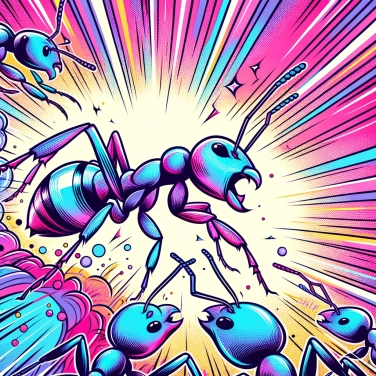In detail, for those interested!
Chemical communication in ants
Chemical communication in ants is an essential mode of communication for these social insects. Ants use chemical signals called pheromones to communicate with each other. Pheromones are chemical substances produced by the glands of ants and detected by the chemical receptors present on their bodies. These chemical signals allow ants to transmit important information such as the presence of food, the location of the nest, potential dangers, or the social status of each individual within the colony. In summary, chemical communication is a fundamental pillar of the functioning of ant societies.
Roles of pheromones in ant communication
Phéromones play an essential role in ant communication. They allow ants to transmit crucial information to their fellow ants, thus facilitating the coordination of activities within the colony. Phéromones can be used to mark a path to a food source, signal an imminent danger, indicate the presence of a queen, or regulate the reproductive behavior of individuals. Thanks to these chemical substances, ants can communicate effectively without the need for direct interactions. Phéromones also help avoid conflicts within the colony by ensuring clear and consistent communication between individuals.
Advantages of using pheromones for ants
Phéromones play a crucial role in the social life of ants, offering several essential benefits for communication and coordination within the colony. The use of pheromones allows ants to quickly transmit important information to a large number of individuals in an efficient and precise manner. This enables collective organization and harmonious collaboration within the colony.
Pheromones also facilitate the recognition of colony members, helping ants to distinguish between members of their own colony and intruders or potential enemies. This helps to strengthen social cohesion and ensure the security of the colony. Furthermore, pheromones can be used to mark paths and food sources, allowing ants to navigate efficiently in their environment and share vital resources with their fellow ants.
Using pheromones for communication enables ants to quickly react to changes in their environment, such as the discovery of a new food source or the presence of imminent danger. This chemical communication gives them a significant adaptive advantage, promoting the survival and prosperity of the colony in variable and sometimes hostile conditions.
Types of pheromones used by ants
Ants use different types of pheromones to communicate with each other. Pheromones can be classified into several categories based on their role and function. Alarm pheromones are released by ants in case of imminent danger, alerting other colony members to prepare to react. Trail pheromones are deposited by ants exploring to mark a path for their fellow ants to follow. Aggregation pheromones are used to gather individuals in the same place, promoting the formation of groups or colonies. Sexual pheromones are emitted by queens and males during breeding periods, indicating their availability for mating. Finally, recognition pheromones allow ants to distinguish members of their own colony from potential intruders, thus contributing to maintaining group cohesion.
Mechanisms of pheromone detection in ants
Ants detect pheromones through receptors located on their antennae. These receptors are proteins sensitive to the chemical molecules present in the environment. When an ant comes into contact with a pheromone, it binds to specific receptors, triggering an electrical signal that is transmitted to the ant's brain. This process allows ants to perceive and interpret the chemical information emitted by their fellow ants. Ants are capable of detecting a wide variety of pheromones, each having a specific role in communication within the colony. Thanks to this ability to detect pheromones, ants can coordinate their activities, organize their movements, and even identify foreign members within the colony.
![Explain why some countries change time zones?]()
![Explain why Alexander the Great refused to wear shoes.]()
![Explain why the last Chinese emperor was so young when he came to power?]()
![Explain why Alexander the Great always wore an impressive helmet.]()





















